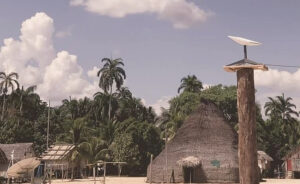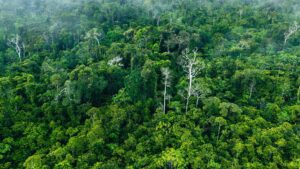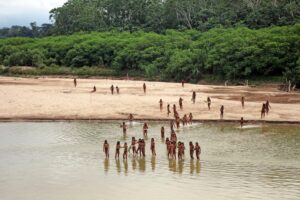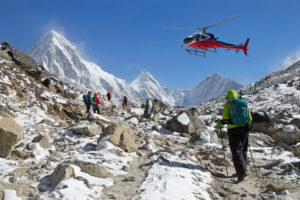The Amazon Triathlon
Abbreviated reprint of the article published in the Polish newspaper “Gazeta Wyborcza” on April 25, 2016
This story is full of meanders like the Amazon River itself. That is the question whether Marcin Gienieczko outsmarted everybody or whether everybody wants to take the record away from the Pole, and why?
By Dominik Szczepanski
Translated by Piotr Chmielinski
The Amazon Triathlon
Abbreviated reprint of the article published in the Polish newspaper “Gazeta Wyborcza” on April 25, 2016
This story is full of meanders like the Amazon River itself. That is the question whether Marcin Gienieczko outsmarted everybody or whether everybody wants to take the record away from the Pole, and why?
By Dominik Szczepanski
Translated by Piotr Chmielinski
Marcin Gienieczko, Polish traveler, promotes himself as the one who undertook the longest, solo canoe expedition in history. His “Energa Solo Amazon Expedition” began on May 17, 2015 over the Pacific Ocean and ended on September 1 at the Atlantic Ocean. He calculates that during the expedition he traveled by bicycle 670 km, paddled in a canoe almost 6,000 km (almost all the way alone) and ran 80 kilometers. According to Gienieczko’s declaration the idea of the expedition was to be running the Amazon alone in the canoe, something that no one had done before.
In the reports on this Amazon triathlon, however, there are holes and misleading statements. His Peruvian guide and many kayakers who paddled the Amazon, in the past and nowadays, and who follow everything that happens on the largest river in the world are accusing him of not telling the truth. The Guinness World Records that details the expedition established by the Pole today is being questioned. The investigation of the details are also of interest to the explorersweb.com, the most prestigious website in the world dealing with issues of expeditions and exploration.
Seeking support and information about the river Gienieczko turned to Piotr Chmielinski, the first man who paddled the entire length of the Amazon in a kayak and raft from the source to the mouth, named the Godfather of the Amazon by Explorersweb, and who is twice posted in the Guinness Book of World Records (Colca Canyon and the Amazon). For the last 30 years Chmielinski has maintained a keen interest in everything related to that river and helps travelers and explorers working in that part of the world.
– Marcin Gienieczko declared that he was organizing the solo trip from San Francisco, Peru to Belem, Brazil. He did not want to face the most difficult mountain section of the Amazon, Apurimac River (about 700 km). When he was about to start his expedition he began saying, that for safety reasons he had to take Peruvian guide, Gadiel (Cho) Sanchez Rivera (Gadiel previously accompanied Ed Stafford while walking along the Amazon), who would accompany him to Atalaya. Chmielinski explained to Gienieczko that this meant his expedition would no longer be a solo expedition. Gienieczko replied that in this case he would paddle solo only from Atalaya.
What does solo mean? Most dictionaries say that it means to do something alone. Synonyms: alone, individually, solely. According to the explorersweb definition solo in relation to river trips means that the traveler is alone and does not receive outside help, no help in paddling, giving a ride, organizing accommodation, food etc.
After they left San Francisco, Rivera paddled with Gienieczko 405 km through the so-called red zone: the autonomous area controlled by Ashaninka Indians that are known to be hostile to strangers, and at the same time this area is the kingdom of cocaine traffickers. The Peruvian’s role was to provide security to the Pole.
When they reached Atalaya, Gienieczko’s expedition was supposed to be really a solo expedition, but it was not. Gienieczko says that from that moment Rivera became only the logistician of the expedition. – He was meeting with me every 200-300 kilometers, he took pictures of me, organized accommodation – explains Gienieczko.
Already organizing accommodation contradicts the idea of an unsupported expedition. But that’s nothing. – In Pebas, the Peruvian Navy told us to travel together to Tabatinga, because two days earlier on the river there had been a pirate attack – says Gienieczko. The Pole interrupted the solo attempt and with his Peruvian guide paddled another 300 km of the river. He initially described it on Facebook, but quickly removed that post. The case only came back during “Kolosy,” the biggest explorer and traveler’s festival in Poland (if not in Europe), where every year a jury composed of eminent people in their fields (such as mountaineering, sailing, caving, travel) votes on awards and distinctions.
Gienieczko stated to the jury questions, that he traveled with Rivera 300 km – from Pebas to Tabatinga. There was something else that caught the jury’s attention. Following Gienieczko’s route set by the GPS transmitters, it turns out that it is not clear what was happening along approx. 100 km on the River Tambo – between Puerto Prado and Poyeni. The jury was surprised by the fact that Gienieczko and Rivera covered that distance in less than 3.5 hours with unbelievable speed of almost 30 km/h. When asked, Gienieczko admitted that in that area he couldn’t manage to survive big water whirlpools and benefited from the aid of motorboat. – The motorboat dragged us for 30 kilometers – he says.
– In summary, of the nearly 6,000 km of the Amazon, 700 km you paddled together with Rivera, and rode 30 km on the motorboat? – I asked Gienieczko to determine the final version, and he confirmed that version. However, his guide, Gadiel Sanchez Rivera said: – Gienieczko is lying; I traveled with him not 700 but about 2,700 kilometers.
The main assumptions of the trip have already fallen: Gienieczko was supported by his Peruvian guide, received the aid of a motorboat, so his expedition definitely was not solo and it was not completed only through the power of his muscles. There is still more. Rivera tells about the events on the river Tambo (recall, Gienieczko swears that the motorboat pulled him only 30 km) – Gienieczko glanced at the map and saw that the turns would be large, predicting dangerous waves and whirlpools. He decided to place the canoe onto the roof of a motorboat and get a ride to Poyeni. So, we traveled approx. 85-90 km on the motorboat – says Rivera. He added that it was not the only situation when Gienieczko benefited from the support of a motorboat. – Before Orellana, Marines pulled us for three hours, which was some 40 km – says Peruvian. He also tells that Gienieczko often paddled a fragment alone, after which he was telling him to get off from the boat and assist in paddling. Where is the boat coming from? After all, Gienieczko says that they were meeting every 200-300 km? – I was traveling along with Marcin on the motorboat he rented – said Rivera, also adding that for a long time they were accompanied by a naval boats – Peruvian first, then Brazilian or other boats in order to keep them safe. On another occasion, Gienieczko ordered him to leave the canoe at the point where Ucayali and Marañon meets and where in geographical terms Amazon starts. – Gienieczko wanted to shoot video and take photos that would show he entered that part of the Amazon alone. Then, I was asked to get back into his boat and we paddled away together – says Rivera.
When docked in Sao Paulo de Olivenca, Rivera left the expedition. – I did not like the way Gienieczko treated me. He didn’t pay me the agreed amount of money, he fed me expired food, while he was eating fresh things – says Rivera. According to Gienieczko, Rivera left him, because he had an appointment with Ed Stafford.
West Hansen, who paddled the entire Amazon in 2012 as part of the sports expedition “Amazon Express” sponsored by National Geographic, whose aim was to run the river as fast as possible, followed the expedition of the Pole and his doubts arose when looking at the daily performance. – He was using a slower boat than mine, paddled fewer hours a day than we did; yet his average mileage was better than ours. It was clear that he was cheating – says Hansen.
If the version of Rivera, analyzed and confirmed by Chmielinski and Hansen, is true, the distance Gienieczko paddled on his own must be adjusted to a little more than 3,200 km what makes it about 40 percent less than the Guinness World Record is claiming.
If considering only expeditions in a canoe, you can find a lot of people who took long solo journeys: Verlen Kruger – 45,130 km, IIlya Klvana – 9,000 km, Mike Ranta – 7,647.5 km. Aleksander Doba kayaked alone across the ocean10,200 km.
– Looking at these numbers, Gienieczko cannot claim that he should hold a world record in the number of kilometers he paddled solo and unassisted in a canoe. Many people have covered much more. In addition, he traveled part of the way accompanied by a guide. It is not honorable and he seems to want to find himself in the Guinness World Records no matter what. He does not care about the truth – says Hansen.
What is Gienieczko’s response to the allegations? He talks about things he publicly did not admit at the time – indeed his canoe was on the motorboat, but only for 10 km, and not 90 as claimed by Rivera. Indeed, before Orellana he grabbed the side of another boat, but only for two kilometers, not three hours as Rivera said. – The Pole denies the fact that the Peruvian paddled an additional 2,000 km with him.
– Rivera wants to get back at me; apparently he feels that his fee was too small. He complained that he helped me a lot and earned little. He did it not for the adventure, only for the money, which is understandable in this part of the world – says Gienieczko.
– I have a lot of experience in expeditions, and for years I have followed closely what is happening on the Amazon. I watched Gienieczko’s progress on the river cheering him to the end of the expedition, but I admit that I did not realize that he was concealing the truth. Facts are difficult to verify even for experts, verification is based on faith in the integrity of the explorers until the moment when it comes to light that their achievements are, in fact, not true – says Chmielinski.
Original story: https://ekstra.sport.pl/ekstra/1,151825,19971902,amazonski-triatlon.html?disableRedirects=true






